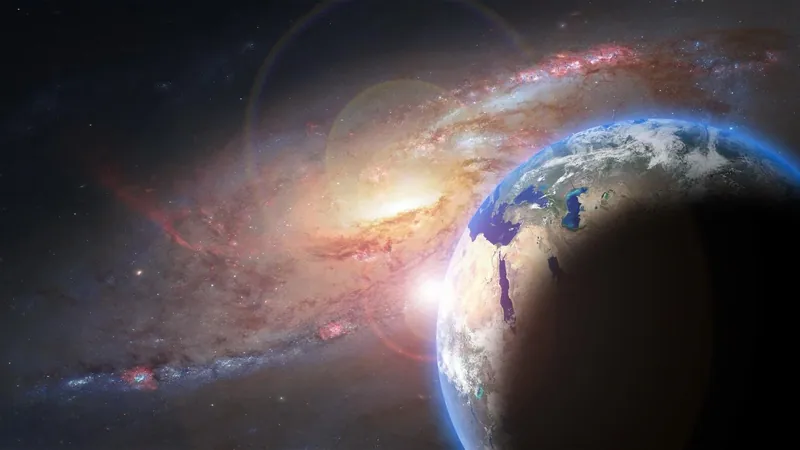
Earth’s Life Surge: Did a Cosmic Collision Save Us?
2025-08-28
Author: Siti
The Unique Origin of Life on Earth
Earth stands as a mysterious jewel in the cosmos—our only known planet thriving with life, liquid water, and a stable atmosphere. But how did it come to be in such a favorable state? In its infancy, Earth wasn't always the heart of life; it was far from capable of fostering existence.
The Building Blocks of Life: A Cosmic Dilemma
The solar system's formation stemmed from a gas-dust cloud rich in essential elements for life—hydrogen, carbon, and sulfur. However, the inner solar system, where the rocky planets like Mercury, Venus, Earth, and Mars reside, was initially too warm for these volatile elements to take solid form.
In the blistering heat of the young sun, these vital particles remained gaseous, leaving proto-Earth, our planet’s early version, largely empty of the ingredients necessary for life.
Groundbreaking Research Reveals Earth’s Chemical Timeline
In a landmark study by researchers at the University of Bern's Institute of Geological Sciences, scientists have uncovered that Earth’s chemical makeup developed rapidly within three million years of the solar system's inception. However, this composition wasn’t conducive to life as we know it.
Dr. Pascal Kruttasch, leading the research, utilized a sophisticated timing system based on the radioactive decay of manganese-53—allowing them to pinpoint Earth's formation timeline with astonishing accuracy. Remarkably, this precision reveals a story of rapid development for our planet.
Could a Planetary Collision Have Sparked Life?
The researchers propose that Earth was initially a dry, rocky entity until a cataclysmic collision with a larger body, named Theia, changed everything. Theia, believed to be rich in water and volatile elements, may have delivered the crucial ingredients necessary for life.
"Our findings imply that life's genesis on Earth was less about a slow evolution and more about a serendipitous collision with a cosmic water carrier," explains Kruttasch.
A Stroke of Cosmic Luck?
This research not only sheds light on Earth’s formative years but also raises questions about life’s existence throughout the universe. Being life-friendly is not a foregone conclusion but rather a rarity that may hinge on unforeseen cosmic events.
As the next step, scientists aspire to delve deeper into the physics and chemistry of the Earth-Theia collision to unravel more mysteries about our origins and the possibility of life beyond our solar system.
The Fragility of Life in the Universe
Ultimately, this study emphasizes a crucial takeaway: life as we know it isn’t guaranteed. It could well be an exceptional outcome of a fortunate cosmic incident—a reminder of our planet's unique stature in the vast universe.



 Brasil (PT)
Brasil (PT)
 Canada (EN)
Canada (EN)
 Chile (ES)
Chile (ES)
 Česko (CS)
Česko (CS)
 대한민국 (KO)
대한민국 (KO)
 España (ES)
España (ES)
 France (FR)
France (FR)
 Hong Kong (EN)
Hong Kong (EN)
 Italia (IT)
Italia (IT)
 日本 (JA)
日本 (JA)
 Magyarország (HU)
Magyarország (HU)
 Norge (NO)
Norge (NO)
 Polska (PL)
Polska (PL)
 Schweiz (DE)
Schweiz (DE)
 Singapore (EN)
Singapore (EN)
 Sverige (SV)
Sverige (SV)
 Suomi (FI)
Suomi (FI)
 Türkiye (TR)
Türkiye (TR)
 الإمارات العربية المتحدة (AR)
الإمارات العربية المتحدة (AR)